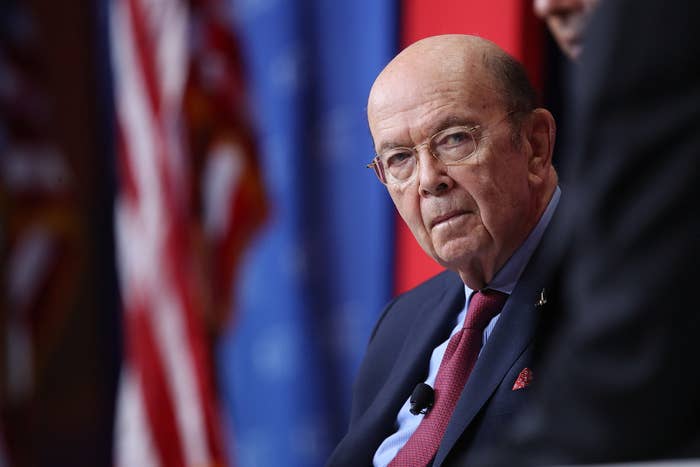
The Supreme Court stopped the deposition of one senior Trump administration official involved in the decision to add a citizenship question to the 2020 census in an order Monday, while allowing another to proceed.
Commerce Secretary Wilbur Ross's ordered deposition will not go ahead at this time, under the Supreme Court's unsigned order, but the deposition of the acting head of the Justice Department's Civil Rights Division, John Gore, will take place.
US District Judge Jesse Furman — who is hearing challenges to the question's inclusion in the once-a-decade census brought by state governments and immigrant organizations — had issued orders allowing for depositions of Ross and Gore.
In the Monday night order from the Supreme Court, the Justice Department has until Oct. 29 to ask the Supreme Court to make a full review of the ordered deposition of Ross. If the government does not seek such review, the stay will end and the deposition of Ross also can proceed. If the government does seek review, the stay of the deposition will remain until the Supreme Court has resolved the issue.
Justice Neil Gorsuch, joined by Justice Clarence Thomas, disagreed with the decision to allow any of the discovery, including Gore's deposition, to proceed, writing that "the plaintiffs would suffer no hardship from being temporarily denied that which they very likely have no right to at all."
The apparent compromise allows the case, led by New York Attorney General Barbara Underwood, to proceed with more discovery.
"We welcome the Court's decision to allow us to complete discovery in the case, with the exception only of Sec. Ross' deposition, which remains on hold pending further briefing," New York AG's spokesperson, Amy Spitalnick, said in a statement. "We'll get to the bottom of how the decision to demand citizenship status was made, as we continue our case to ensure a full and fair Census."
Justice Department spokesperson Kelly Laco called the order "a win for protecting the rights of the Executive Branch" in a contrasting statement.
"The intrusive and improper discovery in this case disrupts the orderly functioning of our government and is, as Justices Gorsuch and Thomas noted, 'highly unusual,'" she said in the statement. "The Department of Justice is committed to protecting the rule of law and looks forward to further proceedings before the Supreme Court."
The US Court of Appeals for the 2nd Circuit earlier rejected the Justice Department's request to stop either deposition, leading to the Supreme Court request. Justice Ruth Bader Ginsburg, who considers stay requests out of the 2nd Circuit, put both depositions on hold temporarily while the Supreme Court considered the stay request.
The ruling is the latest development in a long-running dispute over Ross's decision that has raised questions about his motives, the Justice Department's role in that decision, and other influence — including from the White House — in the move.
The addition of the question, which has not been included in the census since 1950, has been opposed not only by immigrant groups and Democrats but also by former directors of the census under presidents of both parties and the agency's own scientists.
Although the March decision was initially presented as having been generated from a request made by the Justice Department, information made public since then showed that the efforts regarding the question's inclusion came first from the Commerce Department — which sought the Justice Department's assistance in justifying the addition of the question. (Gore had drafted the letter later sent to the Commerce Department.)
Further information suggested that Ross and the Commerce Department had, in turn, received information about the issue from a White House–prompted discussion between Ross and Kansas Secretary of State Kris Kobach — a "voter fraud" hardliner who has had his claims rejected in court. Kobach had been in communication with the Commerce Department, per an email made public earlier this year, "on the direction of Steve Bannon" — the former senior strategist to Trump.
Just this past week, the Justice Department acknowledged additional White House involvement.
"Secretary Ross recalls that Steve Bannon called Secretary Ross in the Spring of 2017 to ask Secretary Ross if he would be willing to speak to then-Kansas Secretary of State Kris Kobach about Secretary Kobach's ideas about a possible citizenship question on the decennial Census," Justice Department lawyers wrote in a court filing before the district court. The filing also acknowledged that Ross spoke with Attorney General Jeff Sessions about the question multiple times.
In an order this past week, Furman told the parties to immediately discuss scheduling the depositions should the Supreme Court allow them to proceed.
